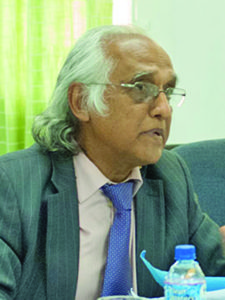Public statements made by Barbados Prime Minister Freundel Stuart in relation to withdrawing his country from the Caribbean Court of Justice (CCJ) as its final court has received mixed reviews.
Local commentator and Attorney Christopher Ram is one who is not too pleased with the timing nor the content of Stuart’s statement, which was made recently at a political meeting in St Michael.
“I think that is most unfortunate because we should be trying to develop some kind of Caribbean jurisprudence, which admittedly the CCJ has not been able to do or has failed to do,” he stated.
While the Barbadian Prime Minister did not go into details, he cited disrespect from the Port of Spain-based court and the limited number of cases being brought before it.
“I am determined to put Barbados on the same level as every other (Caribbean Community) Caricom country by de-linking from the CCJ in its appellate jurisdiction. We went in first and we can come out first,” Stuart said.

But in the same breath, he also stated that he will ensure that Barbados does not return to the Privy Council, which in effect means the Barbados Appeal Court could be made the country’s final court.
More worryingly, however, Ram said the timing of his statement comes almost immediately after a judgement of the CCJ, which he might have considered unpalatable. Ram said this is a bad sign because politicians and political leaders must certainly defer to courts in matters of law.
But Stuart had made it clear that he is not commenting on the decisions of the CCJ, noting that as an officer of the court and as a lawyer, he respects the decisions that courts make.
“When I’ve disagreed with them I appeal them. But, I’m not going to have Barbados disrespected by any politicians wearing robes, it is not going to happen. And I spoke about this privately to the present President of the CCJ. I don’t want to influence any decisions, I don’t care what they decide,” Stuart said.
Again, Ram told this newspaper that the timing of Stuart’s comment is important for another reason, especially when another Caricom member country is considering to make the CCJ its final court.
“I think it is a setback although at the moment, there is no guarantee that he would be able to effect his wish. But coming just before Antigua was supposed to go to referendum. The timing is bad,” he opined.
Only recently, the Antigua and Barbuda Government said it intends to hold a referendum within the next four months on whether or not the island would adopt the CCJ as its final court.
The country’s Prime Minister Gaston Browne, in tabling the Constitutional Referendum Bill 2016 in Parliament in October 2016, urged locals to support the initiative to replace the Privy Council even as he admitted that two-thirds support in the referendum “is a tall order”.
“At this time we should point out what are the weaknesses of the CCJ and try to fix those weaknesses, not try to weaken the court which I think he has done. His (Stuart) decision is certainly sending a signal to Antigua that could have unfortunate consequences,” Ram added.
Nonetheless, Ram firmly believes all Caricom countries should adopt the CCJ, regardless of the current criticisms it is faced with right now. He said if the CCJ has set a precedence based on facts, law and logic, then Caribbean countries should accept it, but must understand that it is still in its early stages.
“I think we all should do that. But Stuart has just undermined that kind of commitment to join the CCJ.”
In March, the Trinidad-based court began the first of several hearings into Guyana’s Government appeal of the sovereignty of the people case.
Guyanese Cedric Richardson had challenged the Constitutional amendments by Parliament that limits the number of times a person can serve as President. He claimed that these amendments were unconstitutional and such a change should have been enacted via referendum. The CCJ is presently considering the case.
But much controversy erupted in Guyana after National Security Minister Khemraj Ramjattan announced at a Berbice, Region Six meeting that the CCJ will rule in the Government’s favour in the case.
This prompted Opposition Leader Bharrat Jagdeo to question how it was that Ramjattan could have made such a public statement and whether or not he had inside information.
“I don’t know whether it’s loose talk or they do have inside information as they say, but either way this could affect the credibility of the court. If they claim they have inside knowledge, it could also be entirely false,” Jagdeo told the media during a recent press conference.
The CCJ was established in 2001 to replace the London-based Privy Council as the region’s final court, but while many of the 15-member Caricom countries are signatories to the court’s original jurisdiction, only Barbados, Guyana, Belize and Dominica are members of its Appellate jurisdiction.
The CCJ also functions as an international tribunal interpreting the Revised Treaty of Chaguaramas that governs the regional integration movement.



